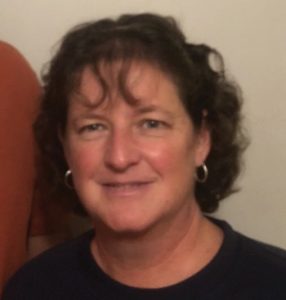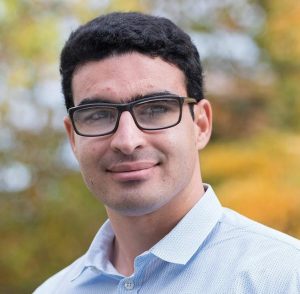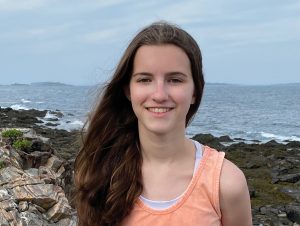2023 LCA Family Conference: Living with LCA–Panelists with varied vision share life successes and challenges
Tami Morehouse is grateful for improved vision after undergoing groundbreaking gene therapy treatment at age 44 for LCA2 RPE65, but at times she still is sad and disappointed at the difficulties presented to her as a person with some functional vision, but who cannot see well.
Mohamed Farid found life living with LCA5 more challenging as a child than as an adult, especially before screen readers and other assistive technology. The young professional also remembers growing up and his grandmother spending a lot of time convincing him he couldn’t be a pilot.
Mirielle St. Arnaud, a junior in high school living with LCA caused by a mutation in her IQCB1/NPHP5 gene, tries to get involved with clubs and activities to ward off struggles with socializing. She learned to adapt to change and said her experiences with vision challenges have been good.
Tami, Mohamed, and Mirielle talked about their day-to-day lives, challenges, and feelings at our 2023 LCA Family Conference* in Indianapolis in late June. They took part in a panel discussion called Living with LCA, moderated by Beth Borysewicz, an educational consultant with the Connecticut Department of Aging and Disability Services with Bureau of Education Services for the Blind.
These three people – an LCA research pioneer, a young professional, and a high school student – help illustrate the manifestation of research advances and assistive technology in the last decade or so.
Here is what they shared with more than 100 people convened for the third Hope in Focus LCA Family Conference.
***
Tami Morehouse
Tami, 59 and from the Cleveland area, is thankful to see with more brightness following her participation in a pioneering clinical trial for what now is known as LUXTURNA®, the only federally approved treatment for one of the 27 identified forms of LCA – LCA2 RPE65.
She gained some vision in 2009 and 2010, when she received the treatment under development by Spark Therapeutics.
“My whole world was a lot brighter,” she said.
She could see a cup on the table, gorgeous sunsets, the lush green of spring, and details in the faces of her three children. It also improved her parenting skills.
“Mom can see things now,” she joked. “It’s bittersweet in our world.”
She also feels she lives in a kind of limbo between seeing and not seeing. She wished and still wishes the public would be more receptive to her being between having sight and not having sight, rather than completely blind.

Tami’s world has widened, and she enjoys much happiness since receiving the gene therapy. She is a Hope in Focus Ambassador, working with our Family Connections program, reaching out to people living with LCA, offering them comfort and kindness. The research pioneer works as an information and referral specialist for 211 in Ohio.
People in the LCA community, like others dealing with a rare disease, experience anxiety, depression, and social isolation.
Tami opened up at the conference, sharing struggles to maintain mental wellness.
She experienced a lot of awkward moments and has worked at becoming comfortable with who she is as a blind person.
“There are so many times when I’m very sad and disappointed about my limitations. There are a lot of barriers in the way and that’s hard to take.”
She misses experiences she could have had with her children and husband and parents.
“Those are just facts of life. Those are my facts, but I think many others go through the same.
“Sometimes we just feel the burn.”
***
Mohamed Farid
Mohamed Farid navigates life with LCA deftly, now that he is an adult.
“It’s harder growing up. It’s easier when you’re older.”
Life became easier with innovative technology, such as screen readers and other optical character-recognition technology that extracts and converts data into a machine-readable form.
“It’s all about assistive technology,” he said.

The 36-year-old founded MKF Continuity, a middle-market investment firm in Chicago. He earned an MBA from Harvard Business School.
There was a time when he was running away from his blindness.
“Now, I’m just ‘whatever’. I need to be independent. It’s important for my dignity. I don’t want to be relying on people.
“Every once in a while, I think the world is unfair,” he said, but over time he’s developed self-acceptance and is at peace with his blindness.
He compared his moving through life now not even thinking about his blindness to his perception of his vision as a child.
“My grandma had to spend a lot of time convincing me I could not be a pilot.”
In contrast, as an adult at his workplace, people think he can create slide presentations.
Mohamed said his blindness has made him strong, describing himself as “alert, scrappy, and resilient.”
***
Mirielle St. Arnaud
Mirielle St. Arnaud, a 16-year-old from the Chicago area, said she’s dealt with people who assume she’s not a capable person.
“We’re probably more resourceful than you think,” she said.
Mirielle is a junior in high school, where she runs on the cross-country team with a guide and is a captain of the Congressional Debate team.
She learned to advocate for herself and set boundaries for others.
Mirielle worked at her difficulties with socialization at school by getting involved in the blind and sighted communities, whether through summer camps or extra-curricular activities, and by meeting as many people as she can.
“At some point, you’ll find your people who will understand you.”
She characterizes her ability to see as “Swiss-cheese vision.”
At school, she collaborates with an advocate throughout the year, using an Independent Education Plan as a guide.
Mirielle said vision specialists collaborating with her schools have been especially helpful along the way. She’s worked with Teachers of students with Visual Impairments, who are educators with expertise with the visually impaired, and Orientation and Mobility specialists, who teach safe and effective navigation through environments.
“I’ve had pretty good experiences,” she said.
***
Wrapping up the session, panelist Mohamed Farid left the audience with this message:
“Our journey can be bumpy. Don’t ever give up hope.”
*Please go to our Hope in Focus website to see three more stories detailing sessions from our 2023 LCA Family Conference. Click here to see a video about the conference.
